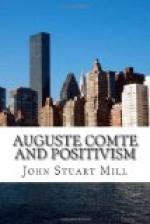be supported by her husband or her male relations,
and if she has none of these, by the State. She
is to have no powers of government, even domestic,
and no property. Her legal rights of inheritance
are preserved to her, that her feelings of duty may
make her voluntarily forego them. There are to
be no marriage portions, that women may no longer
be sought in marriage from interested motives.
Marriages are to be rigidly indissoluble, except for
a single cause. It is remarkable that the bitterest
enemy of divorce among all philosophers, nevertheless
allows it, in a case which the laws of England, and
of other countries reproached by him with tolerating
divorce, do not admit: namely, when one of the
parties has been sentenced to an infamizing punishment,
involving loss of civil rights. It is monstrous
that condemnation, even for life, to a felon’s
punishment, should leave an unhappy victim bound to,
and in the wife’s case under the legal authority
of, the culprit. M. Comte could feel for the
injustice in this special case, because it chanced
to be the unfortunate situation of his Clotilde.
Minor degrees of unworthiness may entitle the innocent
party to a legal separation, but without the power
of re-marriage. Second marriages, indeed, are
not permitted by the Positive Religion. There
is to be no impediment to them by law, but morality
is to condemn them, and every couple who are married
religiously as well as civilly are to make a vow of
eternal widowhood, “le veuvage eternel.”
This absolute monogamy is, in M. Comte’s opinion,
essential to the complete fusion between two beings,
which is the essence of marriage; and moreover, eternal
constancy is required by the posthumous adoration,
which is to be continuously paid by the survivor to
one who, though objectively dead, still lives “subjectively.”
The domestic spiritual power, which resides in the
women of the family, is chiefly concentrated in the
most venerable of them, the husband’s mother,
while alive. It has an auxiliary in the influence
of age, represented by the husband’s father,
who is supposed to have passed the period of retirement
from active life, fixed by M. Comte (for he fixes
everything) at sixty-three; at which age the head of
the family gives up the reins of authority to his
son, retaining only a consultative voice.
This domestic Spiritual Power, being principally moral, and confined to a private life, requires the support and guidance of an intellectual power exterior to it, the sphere of which will naturally be wider, extending also to public life. This consists of the clergy, or priesthood, for M. Comte is fond of borrowing the consecrated expressions of Catholicism to denote the nearest equivalents which his own system affords. The clergy are the theoretic or philosophical class, and are supported by an endowment from the State, voted periodically, but administered by themselves. Like women, they are to be excluded from all riches, and from all participation in power (except the absolute




